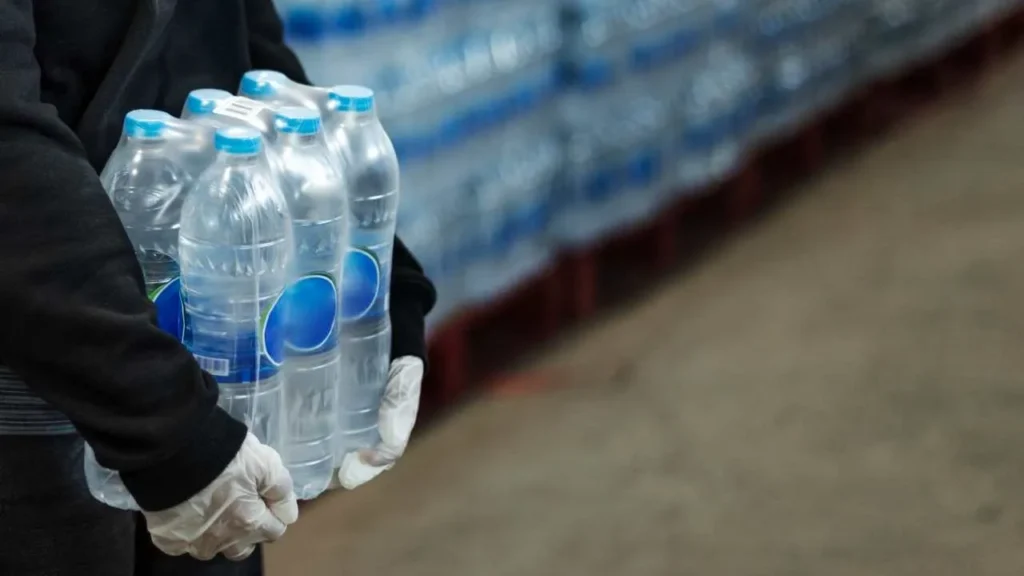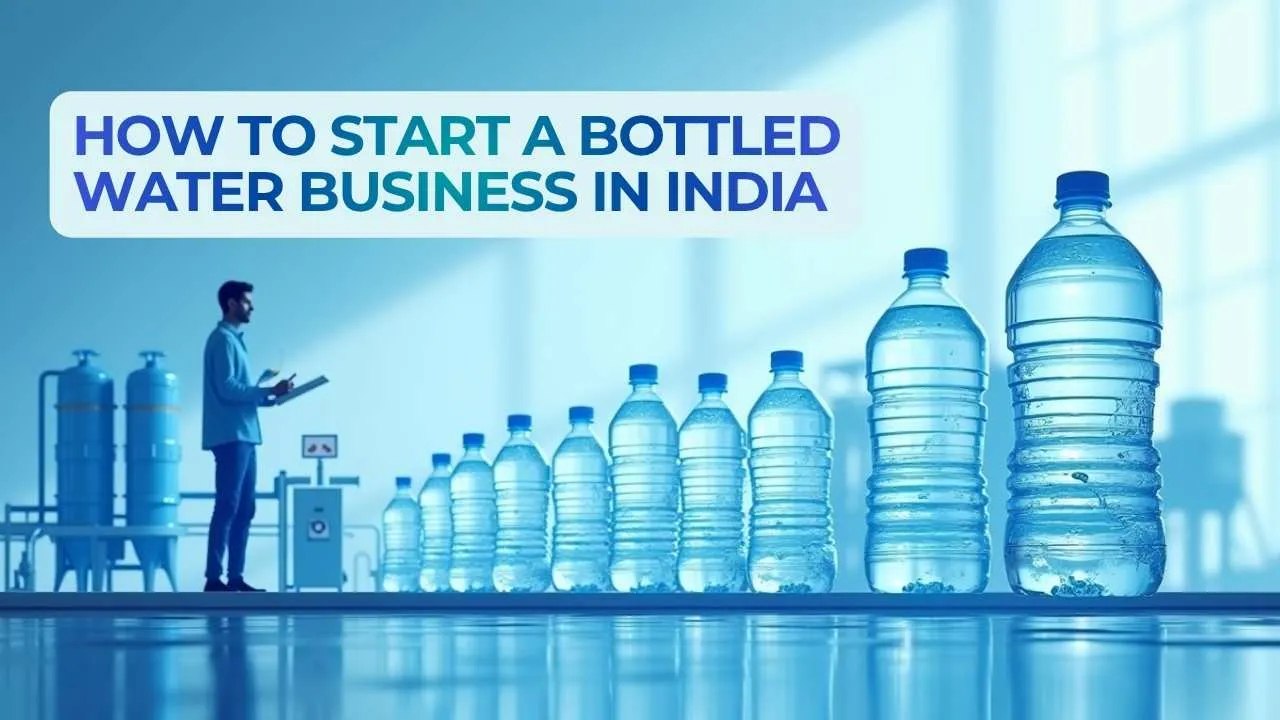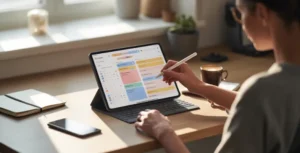The Indian bottled water sector, which has emerged as a highly promising and stability-influencing sector, is a direct outcome of skyrocketing demand for safe, hygienic water in the country. The bottled water industry aims to cater to a densely populated country with an increasing trend toward a health-oriented lifestyle and a vast gap in reliable public water supply.
Moreover, the India Bottled Water Market is expected to reach USD 8.28 billion in 2025 and grow at a CAGR of 10.51% to reach USD 13.65 billion by 2030. A trend not only limited to metro cities but also spreading to Tier-2/Tier-3 cities, where consumers are quality-oriented and willing to pay a higher price for it.
In this article, we will provide a complete, step-by-step guide on how to start a bottled water business in India, covering everything from investment costs to licensing requirements.
Quick Overview of the Bottled Water Market in India

| Category | Details (As of 2025) |
|---|---|
| Market Size | USD 8.28 – 9.5 billion |
| Growth Rate (CAGR) | 10 – 12.5% (2025 – 2033) |
| Major Segments | Purified (RO) Water, Mineral Water, Spring Water, Flavoured/Functional Water |
| Packaging Types | PET Bottles (dominant), Glass Bottles (premium), Cans, Pouches |
| Top Growth Drivers | Urbanization, rising health awareness, tourism, poor tap-water quality, lifestyle changes |
| Leading Brands | Bisleri, Kinley (Coca-Cola), Aquafina (PepsiCo), Bailley (Parle), Himalayan, Catch, Oxyrich |
| Emerging Trends | Premium alkaline/mineral water, eco-friendly packaging, smaller pack sizes, online D2C sales |
| Opportunities | Rural & Tier-2/3 city penetration, premium/functional water, eco-packaging innovations |
| Challenges | Plastic waste & regulation, water sourcing, high logistics cost, intense competition |
| Future Outlook | Strong growth expected; sustainable and premium segments to drive profits |
The Indian bottled water market is highly dynamic, segmented largely into packaged drinking water (the most common type) and natural mineral water. This landscape includes both established national players and numerous regional brands, creating a competitive yet opportunity-rich environment for those looking at how to start a bottled water business.
- Growing demand: Packaged water demand has grown by almost 15% each year over the past few years, driven by the steady rise in disposable income and people’s concern about tap water quality, making it a highly profitable business.
- Segment diversity: The bottled water market is not only about the standard 1-litre bottle; it also consists of 20-litre jars for home/office use and small 200 ml pouches, each targeting a different consumer need and price range.
- Quality focus: After the pandemic, consumers have become more conscious of product hygiene and purity; therefore, quality certifications like BIS (ISI) and FSSAI are of utmost importance and must be strictly adhered to by any brand.
- Rural market penetration: Though urban areas are the main contributors to sales, the bottled water market is increasingly drawing in semi-urban and rural areas, as trade represents infrastructural development.
- Packaging innovation: As consumers increasingly choose products with eco-friendly, easily disposable packaging, businesses are forced to seek sustainable solutions.
How Much Does It Cost to Start a Bottled Water Company?
The initial capital needed for a bottled water business is not fixed; it depends on factors such as plant size (small, medium, or large) and automation level. Here is a rough breakdown of costs for a medium-scale plant (producing 2,000 to 5,000 liters per hour) intending to start a bottled water business in India.
| Cost Component | Estimated Range (INR) | Notes |
| Land/Factory Setup | ₹15,00,000 – ₹30,00,000 | Lease deposit or purchase cost for minimum 2,000 sq. ft. area, including basic civil work. |
| Plant & Machinery | ₹25,00,000 – ₹50,00,000 | Includes RO/Water Treatment Plant, Ozonator, Filters, Rinsing-Filling-Capping Machine, etc. |
| Licenses & Certifications | ₹2,00,000 – ₹5,00,000 | BIS (ISI) certification, FSSAI, Pollution Control Board NOC, etc. (Includes application fees and testing). |
| Source Water Setup | ₹3,00,000 – ₹5,00,000 | Borewell drilling and pump installation, if required, or cost of initial bulk water procurement. |
| Packaging Material | ₹5,00,000 – ₹10,00,000 | Initial stock of bottles (PET preforms), labels, caps, and 20-liter jars (if applicable). |
| Working Capital | ₹5,00,000 – ₹8,00,000 | Salaries, electricity, consumables, and initial marketing for 3 months. |
| Total Estimated Cost | ₹55,00,000 – ₹1,08,00,000+ | This estimate is highly variable; a small-scale, semi-automatic plant can start around ₹30-40 Lakhs. |
Step-by-Step Guide: How to Start a Bottled Water Business
Establishing a business that sells packaged water is a process that is closely monitored and demands careful attention and observance of quality standards. By following these steps, you will learn how to start a thriving bottled water business.
Step 1: Conduct Market Research
Prior to investing, thorough research is a must. This includes:
- Identify Demand: Find out what will be the most profitable product for your area of sale (1-liter bottles, 500ml bottles, or 20-liter jars). For example, office spaces and homes will primarily require 20-liter jars, while retail sales will be made up of 1-liter and 500ml jars.
- Analyze Competition: Comparing prices, distribution channels, and brand positioning of local and national brands will help you locate a competitive gap or niche, such as a focus on a highly purified or “natural mineral” product.
- Source Location: Being close to a good water source (borewell or municipal supply) and near the distribution market can save a lot of money on logistics.
Step 2: Choose your Business Model
The model you operate under will determine how you work and how much you will invest. This includes:
- Manufacturing Plant: It means creating your own water treatment and bottling unit. The model involves heavy initial capital but generates the highest profit margins, and quality is under your complete control. It is the most popular route to know how to start a bottled water business from scratch.
- Private Labeling: Buying purified water in bulk or using a manufacturer’s facility to bottle your product under your brand name is an option. It cuts down the setup costs vastly but leaves you with less process and margin control.
- Franchise Model: The purchase of a franchise in India from a well-known brand can make the process easier, as the business plan, branding, and machinery specifications are given, but it requires royalty payments.
Step 3: Register Your Business (MSME/Udyam, GST)
Registration with the authorities is a must to be able to operate legally and avail financial benefits. This includes:
- Legal Structure: First off, you need to decide on your legal entity (Proprietorship, Partnership, Private Limited Company). Most of the time, a Private Limited Company structure is chosen for the reasons of trustworthiness and easy fundraising.
- GST Registration: A Goods and Services Tax (GST) registration number needs to be obtained. This is necessary for tax compliance.
- MSME/Udyam Registration: By registering your business under the Micro, Small, and Medium Enterprises (MSME) category on the Udyam portal, you become entitled to multiple government subsidies and bank loan benefits.
Step 4: Apply for Licenses
One of the most essential things in starting a bottled water business is to be aware of the regulations and licenses required in the industry. These are the licenses you need to apply for:
- Bureau of Indian Standards (BIS/ISI Mark): Among other things, this is the most important license. It is required of you to get IS 14543 for Packaged Drinking Water or IS 13428 for Natural Mineral Water. The BIS certification takes into account the inspection of the plant and water testing.
- FSSAI License: The FSSAI license, issued by the Food Safety and Standards Authority of India, is compulsory for any food and beverage business in India.
- Pollution Control Board NOC: A No-Objection Certificate (NOC) from your State Pollution Control Board (SPCB) or the Central Pollution Control Board (CPCB) is what you need to get.
- Local Municipal License: A trade license from the local municipal corporation or Panchayat is also required.
Step 5: Set up Infrastructure
Good equipment is necessary for quality work. This encompasses:
- Location & Layout: The factory should be situated at a place that is not near landfills or sewage lines. It should have separate areas for raw water treatment, bottling/filling, and storage of the finished products.
- Machinery: The central machinery consists of the Reverse Osmosis (RO) Plant, a Sand filter, Carbon filter, micron filters, and the Automatic Rinsing, Filling, and Capping Machine. One of the most important instruments is the Ozonator, which is used for the final sterilization and keeping water fresh without any chemical residue.
- Laboratory: A simple in-house lab is required for daily checking of essential parameters such as pH, Total Dissolved Solids (TDS), and alkalinity, which are specified by BIS standards.
Step 6: Branding & Packaging
Your brand is your winning card against other competitors. This encompasses:
- Brand Identity: Select an easy-to-remember and straightforward brand name and create a logo that represents purity and trust. Besides, ensure that it is available legally for registration.
- Bottle Design: The quality of the pack is the decisive factor. Use food-grade PET preforms and make sure the bottle is strong. The label must be a compliant one that clearly shows the ISI mark, FSSAI license number, mineral content, manufacturing/expiry dates, and batch number.
- Unique Selling Proposition (USP): Are you the one with a lower TDS, extra added minerals, or a unique source? Promote this through your packaging and marketing.
Step 7: Distribution & Marketing
Getting your bottles from the plant into the hands of the consumer in a timely manner is really the money-making part of the business. This entails:
- Distribution Network: Focus on local retail stores, Kirana shops, offices, and small eateries to begin with. Establish a delivery system with a few vehicles for 20-liter jars. Regional distributors with already established routes could be your partnership option.
- Pricing Strategy: Set your product’s price at the level of competitors, lighter than the major brands at the start, to attract customers. Besides, please make sure that your price gives room for a reasonable profit after the costs of production, logistics, and retail commission have been taken into account.
- Marketing Focus: Concentrate on the theme of ‘purity.’ Utilize neighborhood advertising (billboards, local newspapers) along with social media to publicize your ISI certification. Run introductory schemes or offer discounts on bulk purchases. Without executing a marketing plan properly, it is impossible to start a bottled water business and to get the initial customers.
Water Bottle Business Profit Margin
The profit margin of the packaged drinking water business is generally reasonable. This is especially true for medium to large-scale operations. The raw material (water) accounts for a very minimal portion of the total cost, whereas that of packaging and processing is quite significant.
- Cost of Production (1 Liter): This involves typically a PET preform (bottle), cap, label, electricity, labor, filtration chemicals, and overhead. The approximate cost is somewhere between ₹3.5 and ₹5.5 per 1-liter bottle.
- Wholesale Price (1 Liter): This will be sold to the distributor or retailer for the price of around ₹8 to ₹12.
- Retail Price (1 Liter): Usually, the Maximum Retail Price (MRP) is 20₹.
It demonstrates more than 100% gross profit margin based on the cost of goods sold. Nevertheless, the net profit margin, after taking into account distribution expenses, commissions, significant brand-building marketing costs, and corporate overhead, is usually around 10%-15% of sales, which is a perfect figure.
Licenses & Legal Requirements
When you are thinking about starting a bottled water business, the legal framework is one of the most important aspects:
- BIS Certification (ISI Mark): As stated, it is mandatory for all packaged water. It involves water testing, laboratory setup, quality control staff, and a detailed inspection of the plant.
- FSSAI License: An absolute must for any food or beverage product.
- Ground Water Withdrawal NOC: In case the water used is from a borewell, you must obtain permission from the Central Ground Water Authority (CGWA). This is now an essential, somewhat complex, requirement.
- State/Central Pollution Control Board NOC: Necessary for all manufacturing and industrial units.
How to Start a Bottled Water Business from Home: Quick Points Only
It is generally not allowed to start a full-scale bottled water plant from a residential home due to zoning regulations, large space requirements, and hygiene standards. But here are points for a small-scale distribution-related model:
- 20-liter Jar Distribution: Work as a local distributor of an already established and BIS-certified brand.
- Minimal Setup: Only a small storage space (non-residential/commercial godown) and a delivery vehicle are required.
- Low Initial Cost: The central part of your expenses will involve the purchase of the initial stock of filled jars and the setting up of the delivery service.
- Simple Licensing: Only GST registration and a basic Municipal Trade License are required, not the complete BIS/FSSAI manufacturing complex.
- Key Challenge: Tough competition and the need for good logistics management.
Bottled Water Business Plan – Table
A well-structured business plan is the blueprint for successfully navigating how to start a bottled water business.
| Section | Key Component | Description/Purpose |
| Executive Summary | Business Concept & Mission | A concise overview of the company, product, and financial projections. |
| Company Description | Legal Structure & Location | Details about the entity type, key personnel, and plant location. |
| Market Analysis | Target Market, Competition | Data on market size, growth, consumer demographics, and competitor pricing/strategy. |
| Products/Services | Product Mix & Quality Control | What will you sell (1L, 20L jar, etc.)? Detail the treatment process and ISI compliance. |
| Operations Plan | Infrastructure & Production | Details on machinery, plant layout, sourcing of raw water, and daily production capacity. |
| Marketing & Sales | Branding, Pricing, Distribution | Strategies for reaching customers and distributors, plus promotional activities. |
| Financial Plan | Cost, Revenue, Break-Even | Detailed projection of start-up costs, projected sales, profit/loss statements, and the point where the business becomes profitable. |
Marketing & Branding Strategies
To survive this competitive sector, a strong brand identity is necessary. A specific marketing plan has to be in place when you are figuring out how to start a bottled water business.
- Highlight Certification: Showcase the BIS (ISI) Mark on all publicity materials, packaging, etc. This is your most significant credibility factor.
- Digital Presence: Create a simple, professional website and utilize social media to run engaging campaigns. Run campaigns focusing on water quality facts and the purity standards you maintain.
- Tie-up with HoReCa: Partner with local HoReCa in order to make your brand their default choice. More so, at competitive bulk pricing.
- Local Event Sponsorship: This will involve sponsorship of local marathons, sports tournaments, or cultural events to increase local visibility and associate your brand with health and hydration.
- Unique Packaging: While expensive, having a bottle that is ergonomically designed or having a unique label might capture the eye on the shelf. On top of this, offer a subscription model for 20-liter jar customers to ensure repeat business.
Conclusion
Setting up a bottled water business in India means investing in an indispensable and highly growing sector. Though the initial capital requirement is high, especially for quality control equipment and necessary licenses, the chances of long-term profitability are great. Success depends on uncompromising quality, effective distribution logistics, and a strong and trustworthy brand.
By diligently following the step-by-step process outlined, from securing the necessary licenses to implementing a brilliant marketing strategy, entrepreneurs can establish a successful packaged drinking water company that quenches India’s thirst for purity.
Explore More Business Opportunitis in India:
- How to Start a Tailoring Business
- Low-Cost Clothing Franchise in India
- How to Earn Money by Watching Videos in India
FAQs
Is the bottled water business profitable?
Indeed, the bottling of water is a highly lucrative business since gross margins are often over 100%, due to the low cost of raw water, while net profits are closer to 10-15% once high fixed costs relating to distribution and marketing have been accounted for.
How much does it cost to start a water bottle company in India?
The total estimated cost for starting a small-to-medium-scale and fully licensed bottled water plant in India generally ranges from ₹55 Lakhs to over ₹1 Crore, depending on the capacity and location of the plant.
How do I start my own bottled water company?
The steps to initiate a bottled water company will range from securing a water source, to registration of the business, acquiring necessary licenses, mainly BIS/ISI and FSSAI, establishment of the water treatment and bottling plant, to building up a proper distribution network.
Do I need a license to sell bottled water?
Yes, you absolutely need licenses. The most critical is the BIS certification (IS 14543 or IS 13428) for manufacturing/packaging, and an FSSAI license for selling the product.



